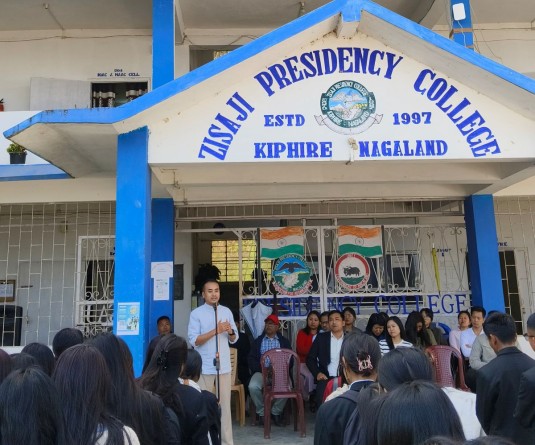
Kohima, February 3 (MExN): The All Nagaland College Students' Union (ANCSU) today submitted a representation to the Vice Chancellor (VC) of Nagaland University HQ Lumami, urging reconsideration of the revised fee structure for college affiliation and the establishment of facilitation centres.
In the representation to the VC, the ANCSU highlighted that a notification from NU on January 21 had drastically revised the fee structure for college affiliation.
While acknowledging the need for a sustainable funding model for the university, the union expressed deep concern over the financial strain that the sudden fee hike would place on students and their families. A vast majority of students in Nagaland come from economically disadvantaged backgrounds, with their parents primarily engaged in subsistence farming and other low-income occupations. Many families already struggle to support their children’s education under the current fee structure, it said.
Hence, an abrupt and excessive hike in fees will only exacerbate their hardships, the ANCSU maintained, adding that the consequences of this decision could be dire, potentially discouraging deserving students from continuing their higher education due to financial constraints.
This, in turn, could lead to an increase in dropout rates, negatively impacting the overall educational landscape of the state, it stated.
While noting that a university requires adequate financial resources to function efficiently, the union also stressed that education must remain accessible and inclusive.
Any drastic policy change, such as a significant increase in affiliation fees, should be implemented in a phased manner after due consultation with stakeholders, including student representatives, college administrators, and parents, it contended.
This, the ANCSU said, would allow institutions and students to prepare for the financial implications without undue hardship.
In this connection, the union earnestly urged the NU to reconsider the revised fee structure and explore alternative measures for resource mobilization that do not disproportionately affect students.
Failure to address this issue could have serious repercussions, and Nagaland University would bear the responsibility for any negative impact on students' educational pursuits, it added.
Proposals for NU Facilitation Centres
Meanwhile, the ANCSU also highlighted to the VC another critical concern that has been persistently raised by college authorities and students—the logistical difficulty of travelling to Lumami for official documentation and administrative work.
This causes considerable inconvenience, adds financial burden, and creates operational inefficiencies for both the colleges and students, it said.
To address this longstanding issue, the ANCSU proposed the establishment of Facilitation Centres at NU Meriema (Kohima) and Medziphema campuses to serve as “official extension offices to handle submissions, processing, and distribution of academic and administrative documents,” significantly reducing logistical difficulties.
Additionally, in this digital age, the ANCSU noted that it is imperative for universities to adopt modern, student-friendly solutions.
To this end, it urged the NU to introduce an online payment system for fees and transactions related to college affiliation, student records, and other administrative procedures.
If complete digitisation is not immediately feasible, the proposed facilitation centres should be authorised to handle such financial transactions on behalf of the university, it added.
Stating that the concerns outlined above directly impact the accessibility, efficiency, and inclusivity of higher education in Nagaland, the ANCSU requested the VC’s urgent and empathetic consideration of these issues and sought assurance of necessary action at the earliest.
The representation, appended by ANCSU President Tenyesinlo Bukh and General Secretary Kivinoka A. Sema, expressed hope that the NU would act positively in the best interest of its students and affiliated institutions.





